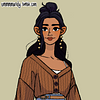Take a photo of a barcode or cover
Graphic: Chronic illness, Drug abuse, Emotional abuse, Sexual content, Suicidal thoughts, Toxic relationship, Violence, Vomit, Grief, Death of parent, Pregnancy, Gaslighting
Favourite quote:
[Naomi to Peter] "You tell me you love me and then it's alright, goodbye, I never want to see you again. Just so you can delude yourself that you're normal, everything is normal. You're so fucking sick in the head you dont even see what you're doing to yourself. Trying to put everyone in their little box. And if we would all just stay there, then there wouldn't be any problems."
Moderate: Alcoholism, Death, Drug abuse, Drug use, Emotional abuse, Mental illness, Misogyny, Sexism, Sexual content, Sexual violence, Suicidal thoughts, Terminal illness, Toxic relationship, Violence, Vomit, Grief, Death of parent, Gaslighting, Alcohol
Graphic: Grief
Moderate: Emotional abuse, Physical abuse
It was very weird and unpleasant to read about all the people hating each other, somehow loving but hurting each other.
Graphic: Alcoholism, Drug abuse, Emotional abuse, Suicidal thoughts, Toxic relationship, Medical trauma, Death of parent, Alcohol
Her use of sentence structure is nothing short of masterful, she is able to capture the unique voices of all her characters.
It was clear from the beginning that
Graphic: Addiction, Alcoholism, Cancer, Chronic illness, Emotional abuse, Mental illness, Panic attacks/disorders, Self harm, Suicidal thoughts, Toxic relationship, Vomit, Grief, Death of parent, Gaslighting, Alcohol
Moderate: Ableism
Graphic: Emotional abuse, Mental illness, Suicidal thoughts, Toxic relationship, Grief, Death of parent, Alcohol
The novel “Intermezzo” deeply redefines the meaning of vulnerable narrative point of views. Appropriately titled, the work follows characters in waiting, in between chapters—of relationships, of careers, of success, of leaning into what they most need for their lives. Much like many intermezzos I’ve also played musically, there is also a pervading sense of intimate melancholy, forced isolation, whiffs of dreams. We find deep dives into emotions and deep desperation—to be loved, to feel loved, to revisit love, or to reject love with other themes or melodies we think we must embrace.
This book is so well composed, yet my feelings were vacillatingly mixed. I definitely felt biases toward and against various characters in their hypocrisies, but found the varying point of views always intriguing. At times, the vivid intimacy element is haunting, at times painfully awkward, but I appreciate the author’s efforts to construct something human in all shapes of real.
Graphic: Sexual content
Minor: Alcoholism, Cursing, Drug use, Emotional abuse, Infidelity, Mental illness, Misogyny, Suicidal thoughts, Toxic relationship, Violence, Grief, Medical trauma, Outing, Gaslighting, Toxic friendship, Injury/Injury detail
Loved the themes of societal norms, pressure to conform and fear of other people's perceptions, age gaps and polyamory, grief and mental health, family dysfunction and strained relationships. There was a lot going on but everything was explored enough to satisfy.
Ivan was such a sweet, neurodivergent coded character--far from perfect but I loved him instantly. Peter took a bit more time/effort to connect with but he got to me eventually.
The audiobook was perfectly narrated.
"No one is perfect. Sometimes you need people to be perfect and they can’t be and you hate them forever for not being even though it isn’t their fault and it’s not yours either. You just needed something they didn’t have in them to give you. And then in other people’s lives you do the same thing, you’re the person who lets everyone down, who fails to make anything better, and you hate yourself so much you wish you were dead."
Moderate: Ableism, Cancer, Chronic illness, Drug use, Emotional abuse, Mental illness, Sexual content, Suicidal thoughts, Toxic relationship, Violence, Grief, Death of parent, Gaslighting, Alcohol
Minor: Addiction, Animal cruelty, Bullying, Infidelity, Sexism
Graphic: Emotional abuse, Misogyny, Pedophilia, Sexism, Suicidal thoughts, Toxic relationship, Violence, Death of parent, Gaslighting, Classism
I will give Rooney her laurels for two things. The first being that I can understand why people are drawn to her books. She does a good job of fleshing out her character’s thoughts and really showing you their perfections of reality - especially the parts that make them aggravating. I can tell that she understands to some degree the capacity for human psychology, multiplicity of thought, and the miscommunication that happens in all human connections. The second thing is that Rooney does a good job of demonstrating how pervasive patriarchal stereotypes and commodification of women occur, in an overt, brash, incel-labeled manner, and the insidious, internalized, gaslit, and pervasive manners.
I don’t find these writing chops enough to overcome the multitude of sins Rooney commits in her writing. If this novel is anything to go by, they are so painfully male centric. While the two brothers are foils to each other in how they process grief (which is the red herring of this book by the way), they are foils to demonstrate how men poorly treat women. One brother, Ivan, self labels as an incel, but it’s because he didn’t know any better and was simply testing out world philosophies until he got older. One brother, Peter, is a self labeled human rights activists who champions women’s rights and yet puts himself in a deceitful love triangle that nearly ruins the lives of two good women as collateral.
The novel continually portrays women as the rehabilitation homes for these men and their dysfunctional lives and dysfunctional processing skills. These women are physically and emotionally battered from their own complex lives and yet they are the ones providing therapy, emotional processing, love, sex, and other needs meeting for these two pathetic men. These women could each have such rich lives but instead are reduced to flat, inanimate objects, used only to gratify each brother’s lust or need for emotional soothing. I nearly quit reading this book so many times after reading another onslaught of one of these women being vulnerable and these men preying on their emotional abilities to unwind their traumas.
Another element I absolutely detested was the implicit nodding Rooney was doing in making Ivan a neurodivergent character. First off, I think it quite frankly does nothing for the disability community to see a white, privileged, middle class , heterosexual man, who is a chess savant, be the representation of neurodivergence. Not only does it fall into so many unhelpful stereotypes, but Ivan’s atrocious behavior is often implicitly related to being a by product of his neurodivergence. I don’t think Rooney has the faintest clue of what she was trying to do with this character. I for one saw Ivan representing something else, not neurodivergence. He seems to me to be an example of a person with Borderline Personality Disorder. His character is someone who thinks purely in black and white, who does a lot of splitting (a rationalization in which things or a person are completely good or completely evil), and latches onto a romantic partner immediately and shows a disproportionate emotional attachment to them (sometimes called a “favorite person”). This is not all the issues that people with BPD face and it’s possible that Rooney wasn’t even trying to bring about this correlation. But to me, I see more character traits and thought patterns reminiscent of a personality disorder than neurodivergence in Ivan. And I could do the same analysis for Peter as well (especially with his penchant for violence, emotional gaslighting, and quick devolution into self harm).
In all, while this book has some interesting passages, there are some glaring issues, namely the way in which Rooney writes her women characters. Which is quite alarming to me considering the fact that her readership base is female. She’s basically glorifying a woman’s suffering and emotional abuse in a relationship all for the point of rehabilitating men who are too weak, too shallow, too selfish, and too self possessed? It’s as if you’re stargazing into a puddle. That’s all I could see in this book. And after reading it, I think I’ve seen all that I want to see about Rooney’s works. I prefer my authors and their works to decenter men fully.
Graphic: Alcoholism, Cancer, Death, Drug abuse, Drug use, Emotional abuse, Mental illness, Misogyny, Panic attacks/disorders, Self harm, Sexism, Sexual content, Suicidal thoughts, Terminal illness, Toxic relationship, Medical content, Grief, Suicide attempt, Death of parent, Gaslighting, Toxic friendship, Alcohol
Moderate: Ableism, Addiction, Adult/minor relationship, Homophobia, Infidelity, Blood





